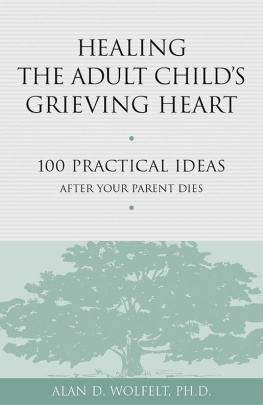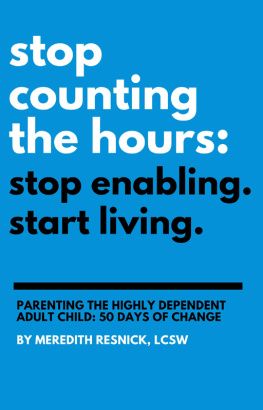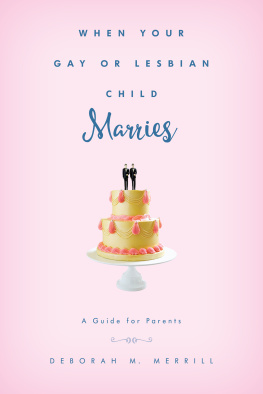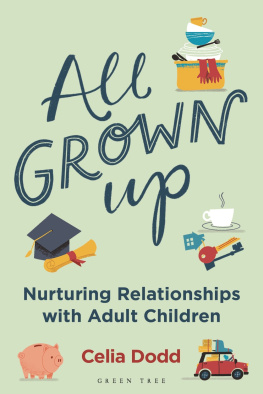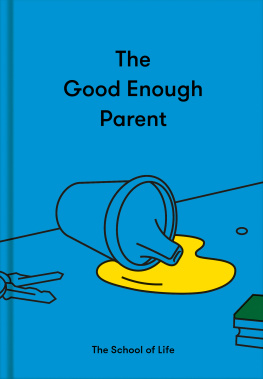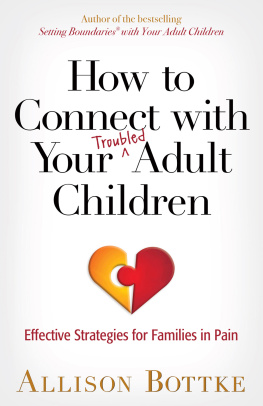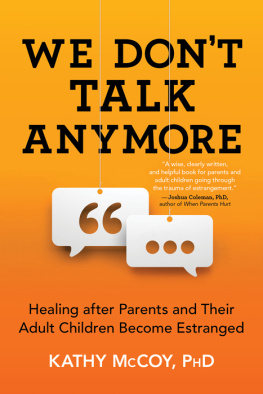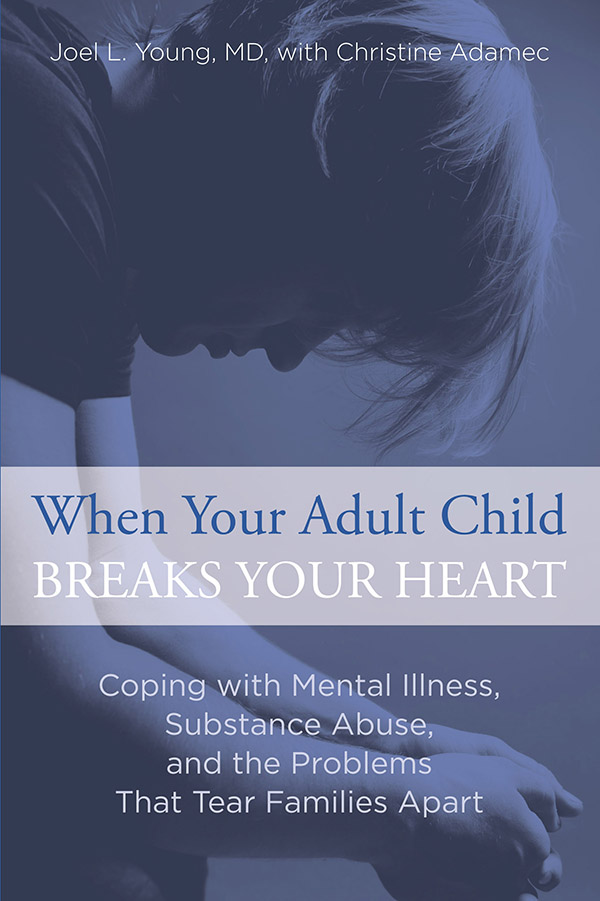Praise for When Your Adult Child Breaks Your Heart
At a time when we have a veritable crisis of adult children coping with mental illness, substance abuse, or their combinationcoupled with a lack of resources for their concerned parentsthis book provides understandable, practical advice for parents that is useful in real life. Dr. Young is a member of the new generation of psychiatrists unburdened by the tradition of a hierarchy and stereotype and is to be commended for the effort he expended in putting together this concise and practical summary in this important, underserved area. Any parent and clinician would benefit greatly from reading this book.
David R. Rosenberg, MD, professor and chairman, Department of Psychiatry and Behavioral Neurosciences, Wayne State University; and psychiatrist in chief, Detroit Medical Center
It is often very hard to find help for despairing parents of adult children with mental illness and substance abuse. Easily understood and clearly written, replete with anecdotes, advice, and quotations from real people, this unusually helpful book offers timely and practical information.
Mark S. Gold, MD, distinguished professor, University of Florida; and chairman, Department of Psychiatry
This authoritative guide couples practical, no-nonsense information with support and reassurance. A must-read book for parents who wonder what went wrong and who mistakenly blame themselves.
Irene S. Levine, PhD, professor of psychiatry, NYU Langone School of Medicine
Parents struggling to understand and support their adult children in distress now have this engaging, comprehensive, and practical book. In When Your Adult Child Breaks Your Heart, Dr. Joel Young provides invaluable information, stories, and strategies. He has given us an essential go-to-resource for families and those who work with them.
Steve Weine, MD, professor, Department of Psychiatry, University of Illinois at Chicago
Brain-behavior illnesses almost always become family issues. Family and friends are impacted, play crucial roles in assisting children of any age in finding and adhering to treatment plans, and are always in need of guidance about how to navigate the predictable hurdles. This book by Dr. Young provides a road map that helps parents along often-rocky roads.
John Greden, MD, executive director, University of Michigan Depression Center, University of Michigan Medical School
This book addresses an often overlooked cost of mental illnessthe agonizing suffering of family members who make every attempt to support and love the impaired adult child. You will appreciate the in the trenches insights and guidance these knowledgeable authors offer.
David W. Goodman, MD, assistant professor, Johns Hopkins University School of Medicine, Department of Psychiatry and Behavioral Sciences; and director, Adult Attention Deficit Disorder Center of Maryland
W HEN Y OUR A DULT C HILD B REAKS Y OUR H EART
Coping with Mental Illness, Substance Abuse, and the Problems That Tear Families Apart
Joel L. Young, MD and Christine Adamec
Lyons Press
Guilford, Connecticut
An imprint of Globe Pequot Press
Copyright 2013 by Joel L. Young, MD, and Christine Adamec
ALL RIGHTS RESERVED. No part of this book may be reproduced or transmitted in any form by any means, electronic or mechanical, including photocopying and recording, or by any information storage and retrieval system, except as may be expressly permitted in writing from the publisher. Requests for permission should be addressed to Globe Pequot Press, Attn: Rights and Permissions Department, PO Box 480, Guilford, CT 06437.
Lyons Press is an imprint of Globe Pequot Press.
Text design: Sheryl P. Kober
Layout: Mary Ballachino
Library of Congress Cataloging-in-Publication Data is available on file.
E-ISBN 978-1-4930-0395-2
The health information expressed in this book is based solely on the personal experience and professional knowledge of the author and is not intended as a medical manual. The information should not be used for diagnosis or treatment, nor as a substitute for professional medical care.
CONTENTS
INTRODUCTION
Most of the time, the struggles of adult children with antisocial personalities, mental illness, or substance abuse fall to their parents and family. The rest of society, wrestling to get by every day with their own concerns, is oblivious to this human drama. Once in a while, these problems stand out in sharp relief, as happened on a winters morning in Newtown, Connecticut, in 2012. Although we will never be certain what was in the mind of Adam Lanza before he murdered the children and teachers of Sandy Hook Elementary, it became apparent that he was mentally ill. The nation united in grief but divided on solutions. Some people mobilized to ban or limit gun sales, while others focused on the issues of health care accessibility for the mentally ill. Everyone involved in the national conversation became intrigued about Adams relationship with his mother, the caretaker who spent most of her waking moments with him and who was rewarded with a gunshot wound to the head as she slept.
This book focuses on the parents of adult children with serious issues. Some of these children become violent, although most are not homicidal. Others dispense their anger, depression, and rage on themselves, and spend time teetering on the suicidal brink. Still others harm their own children because their judgment is impaired by mental illness or substances such as alcohol, illegal drugs, or misused prescription drugs. Behind each of these scenes are devastated parents, always laboring about how best to help and uncertain about the coming chaos.
When Your Adult Child Breaks Your Heart is not just a self-help book for parents who are unhappy with their relationships with their adult children. There are a million ways to be disappointed. You may be unhappy that your child did not get through school and has settled on a mediocre job. You might bemoan that he gave up too easily on his athletic career. She might have married someone outside your faith or you might disapprove of how your grandchildren are being raised. These all can be distressing problems, but they have been discussed elsewhere and are not the focus of this volume.
Many of the available books dedicated to the adult child/parent relationship are written for adult children who are caring for their elderly parents and who worry about their parents health and well-being. We reverse the equation. When Your Adult Child Breaks Your Heart provides information and advice for parents whose adult children are pushing them to the limits. In this approach, it is the parents of the adult children who are in need of information.
The economic recession of the last few years deeply altered the natural order. The shortage of entry-level jobs and cheap housing forced many adult children to return home. Population researcher Joan R. Kahn identifies this trend in a recent study of shifting economic power between 1960 and 2010. Older Americans are in a stronger financial position than previous senior generations, but the financial strain on younger people is great. She notes, We find that younger adults have become more financially dependent on their parents and that while older adults have become more financially independent of their adult children, they nevertheless coreside with [live with] their needy adult children.


